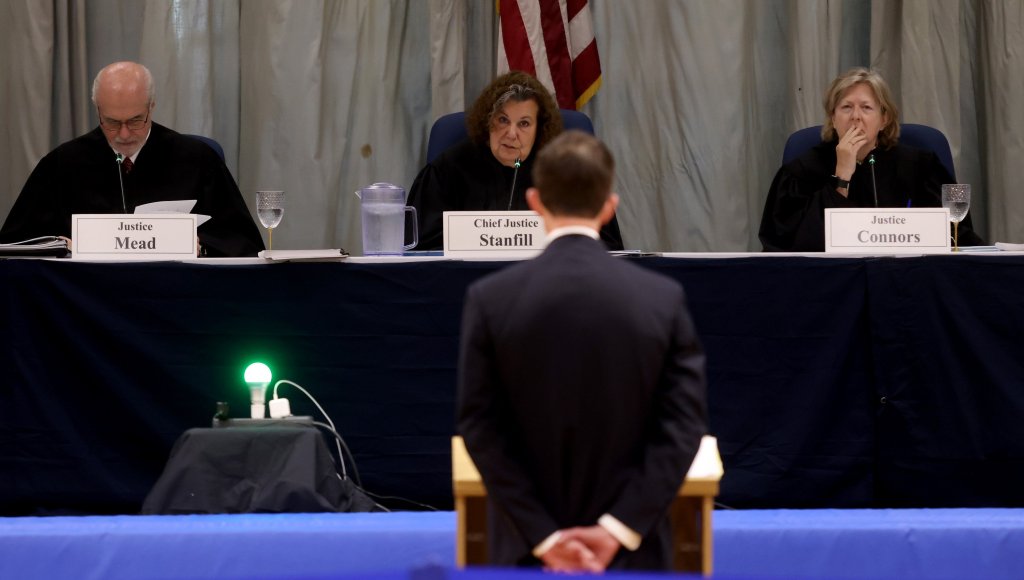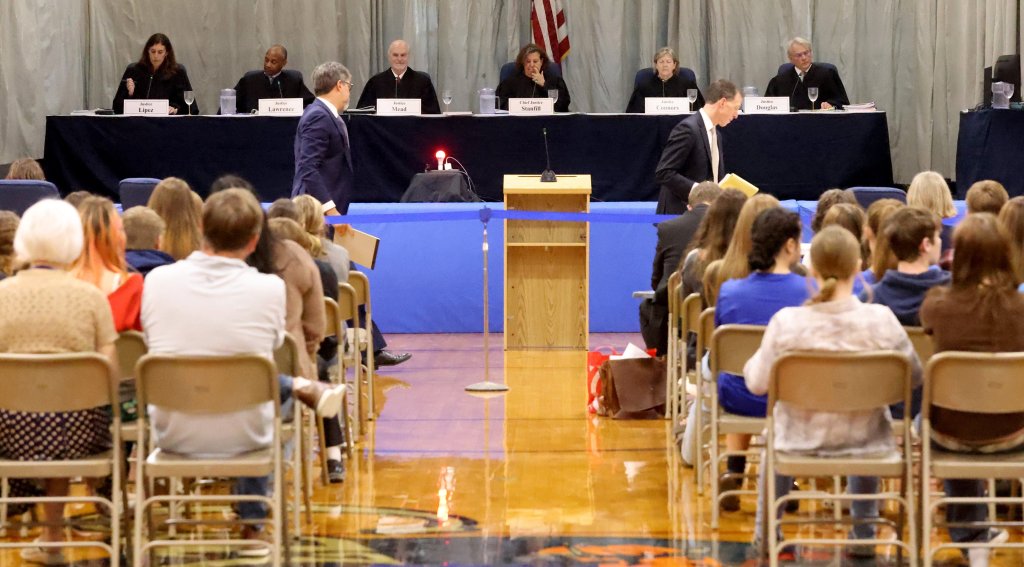
Maine’s highest court is weighing in for the first time on the state’s public defense crisis, as it decides whether to approve a lower court’s plans to release unrepresented defendants from jail and drop charges against them.
The Maine Supreme Judicial Court heard oral arguments on Tuesday from attorneys for the state and the American Civil Liberties Union of Maine, which sued the state in 2022 for alleged failures in its public defense system.
Superior Court Justice Michaela Murphy found in January that the state was violating its constitutional obligations to provide attorneys to criminal defendants who can’t afford their own. Murphy was planning to release people from custody this spring who had been waiting more than three weeks for a court-appointed attorney and to dismiss charges against defendants who had been waiting more than two months. Under Murphy’s plan, charges could be refiled once lawyers are found.
The state appealed her order, arguing that Murphy exceeded her authority by approving the ACLU’s request.
Murphy’s plans remain on pause while the supreme court decides the case. There’s no timeline for its decision.
Maine judges have been holding weekly hearings to consider releasing unrepresented defendants since November 2023, when the state was already struggling to find lawyers in hundreds of cases.
ACLU attorney Carol Garvan said Tuesday those hearings have “not resulted in any meaningful remedies and our crisis continues to escalate.” A regularly updated list of cases showed there were nearly 500 people who needed a lawyer as of Monday.
The ACLU and the state argued their sides in front of about 100 students and staff in the Upper Kennebec Valley High School gym, as part of the high court’s yearly tour of Maine schools.
Students were allowed to ask the lawyers questions after the justices stepped away. When one asked what kind of a solution they wanted, both sides said they agree that defendants have a right to an attorney and that the state has struggled for years upholding that right.
Assistant Attorney General Sean Magenis, who is representing the Maine Commission on Public Defense Services, told the school his clients want “that folks get lawyers as soon as possible.”
“The difference here, the claim here, is whether that delay is a violation of the United States Constitution at all,” Magenis said.
Magenis argued it’s not. Justices raised the same question.

The court questioned when a lawyer’s absence actually harms a criminal case. They also seemed skeptical of Murphy’s authority to dismiss charges statewide.
Magenis argued that defendants have a right to a lawyer as soon as their case begins, but that a delay is legally appropriate, as long as they have an attorney for their “dispositional conference,” which is when both parties are supposed to discuss an upcoming trial or negotiate a plea. Defendants are usually represented temporarily on their first day in court through the commission’s lawyer of the day program, often to argue bail conditions.
In her order on Jan. 3, Murphy found these delays are “unconstitutional” and determined defendants have a right to “continuous representation.”
Associate Justice Catherine Connors said that, to her, it seemed none of the defendants the ACLU is representing “has actually been deprived of counsel at any critical stage.”
“They just had a delay after the appointment of that counsel,” Connors said. “Correct? Is this even a Sixth Amendment issue, or is it a speedy trial issue?”
Chief Justice Valerie Stanfill asked how being in custody without a lawyer is illegal. She told Garvan to consider the hypothetical case of a defendant in jail who has been accused of a violent felony.
“Why is that restraint of this person, who there is probable cause to believe committed a violent felony … why is the restraint illegal because of the lack of counsel?” Stanfill asked.
Garvan described the kinds of delays that can result if a person doesn’t have a lawyer to advance their case, to investigate their charges or negotiate a deal with prosecutors. Garvan also said she considers the existence of charges to be a form of “restraint.”
Murphy said she would dismiss charges “without prejudice,” meaning prosecutors would be able to refile them once a defendant had access to a lawyer. But justices said they didn’t know if that was practical.
“Effectively, if the case is dismissed, no one is going to be looking for counsel,” said Associate Justice Julia Lipez.
“Or even have a right to counsel,” Stanfill added.
Individual members of the high court have weighed in on the state’s public defense woes a few times in recent years.
In February, Stanfill endorsed a new law that would allow judges to temporarily appoint attorneys, without having to work through the commission, which is responsible for ensuring public defense lawyers are eligible for their work. Some have said the commission’s standards are to blame for being onerous, which the agency has disputed.
Judges had only appointed lawyers in about 30 cases as of Tuesday, according to data from the courts. Most appeared to already have been vetted by the commission in previous cases.
Associate Justice Wayne Douglas considered a request to release a woman from custody more than two years ago, after she spent nearly three months in jail without a lawyer. He declined at the time to create a statewide process for releasing unrepresented individuals, but suggested a class-action case might be more appropriate. He did not reference the ACLU’s case, which had been granted class-action status by that time.
On Tuesday, Douglas still had questions about Murphy’s framework for releases and dismissals.
When the ACLU on Tuesday cited a similar framework for dismissals and release in Massachusetts, he pointed out that decision was made based on Massachusetts law, not Maine’s.
Maine was the last state to hire public defenders in late 2022.
Even with about 30 public defenders working statewide, Maine still relies mostly on private attorneys who agree to take public defense cases and get reimbursed by the Maine Commission on Public Defense Services. The agency has warned it will run out of funds to pay all of its lawyers next year without additional funding from the state.
